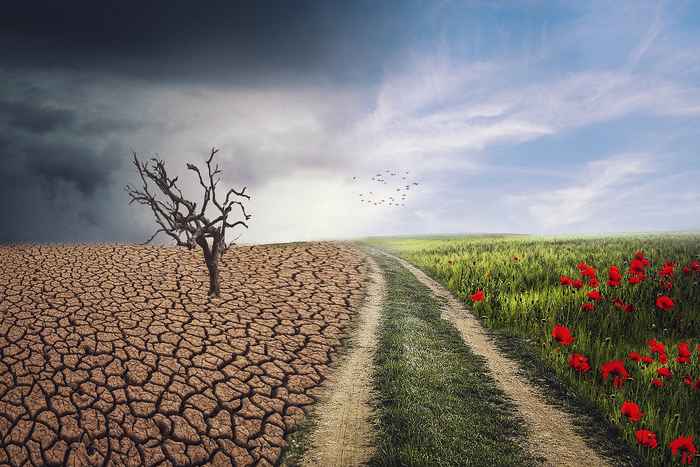Spinoza Prize winner Joyeeta Gupta: 'It's not an easy message'
7 June 2023

Congratulations on this wonderful award.
‘Thank you. The scientists who have received this award in the past represent the absolute best of Dutch academia, so I’m honoured to be considered alongside them.’
The citation for the prize mentions how you combine history, law, climate change and economics in your research – which is the main thread?
‘Climate change and water are my main areas of expertise, but always from an international development studies and justice perspective.’
What will you do with the money that comes with the prize?
‘The end goal of the project that the prize money will fund, at least as far as I can currently envisage it, is to work towards implementing the ideas presented in my inaugural lecture in 2014 – on sharing ‘ecospace’ (environmental utilisation space) globally. This would require some kind of global environmental constitution. Such a constitution would aim to protect environmental conditions in an equitable manner worldwide using constitutional law, and would be a fitting way to bring global environmental and developmental issues together.’
The prize citation also mentions the breadth of your research and its deeply interdisciplinary nature. How do you find working across so many different fields?
‘I have two Bachelor’s degrees, in Economics and law, a Master’s in law and an interdisciplinary PhD defended at the Law Faculty of the Vrije Universiteit. After I moved to the Netherlands from India via the United States, I couldn’t initially work as a lawyer in the civil law system, so I adapted myself to work in interdisciplinary research. I was in the Faculty of Earth and Life Sciences at the VU. At the IHE Delft Institute for Water Education, where I have been teaching since 1990, I was initially working with water engineers. Now I fall under Human Geography and Social Science at the UvA. So interdisciplinarity is at the core of my academic history.’
‘And when it comes to the subject of climate change, we have to work in interdisciplinary collaborations, there is no alternative. All the fields which my work now touches on are inextricably linked: whether you’re looking at food, water, soil, biodiversity, climate - you just can’t separate them.’

What are the biggest issues currently preventing action on climate change?
‘The ongoing postponement of the decision-making process with respect to climate targets means that we are in a situation where we continue to use fossil fuels while also trying to tell the developing world ‘You can’t use them’. But we’ve also reached a point where the global North cannot control the global South anymore. The South is massive, it’s getting wealthier, and more than 80% of the remaining fossil fuels are in their territories. How do we convince developing countries not to use their fossil fuels if we continue to use them in the North, especially as most of the wealth of the North is fossil fuel-based, historically. The South also has major biodiversity hotspots – so if they continue to remove that biodiversity to fuel growth it’s going to be a massive problem for the whole world. The North has squeezed the South in the past; this might boomerang on us, since our own environment is going to be heavily adversely affected unless we work on finding just solutions to all these issues which we now jointly face.’
What are the most important steps that we need to take?
‘In my recent project for the Earth Commission, we tried to quantify what kind of minimum needs we should recognise worldwide in terms of food, water, shelter and infrastructure, and what meeting those minimums means in terms of global emissions. And what we show is that if we want to meet those minimum needs then we will cross safe planetary boundaries unless we redesign the way our societies are run. We have also just published a paper on safe and just earth system boundaries within which humans need to live. Now we need to figure out exactly what sort of transformations are needed.'
'At the moment so much human endeavour is focused on ‘more’: more GDP, more profits for businesses, more consumer items, and this drive towards ‘more’ is causing us to massively overuse our resources and pollute our environment. So we actually need to focus on deeply fundamental questions like ‘What is happiness, what is human wellbeing?’, and we need to reorganise our global system in a way that we can manage with far less and still be just as happy and healthy. We therefore need to demonstrate empirically that without fair approaches, it will be impossible to live within our environmental resources. In my European Research Council project we are trying to see under what conditions large investors (banks, pension funds, philanthropies, multinationals) will be willing to redirect their fossil fuel investments to more sustainable ones; and we are trying to see under what conditions poorer countries that have just discovered fossil fuels would be willing to not use those fuels.’
‘It won’t be an easy message to communicate, either to rich countries, where it will be received as ‘We have to give stuff up’, or poor countries, where they say ‘Why don’t we get to have the lives you all had?’, but we have no choice but to try – we’re talking about the very existence of all of us here.’